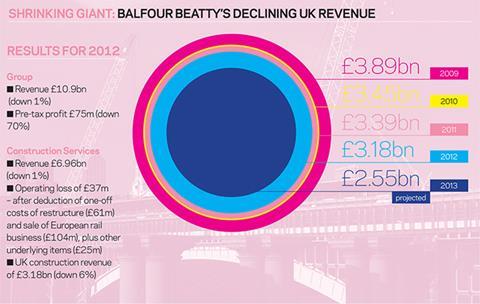Construction giant announces it is to withdraw from bidding on ‘uneconomic’ work and switch focus to restricted markets

Balfour Beatty expects its UK construction revenue to fall by 20% this year to around £2.55bn as the industry heavyweight withdraws from bidding on “uneconomic” jobs.
Reporting its results for the year to 31 December 2012 last week, Balfour Beatty Group posted revenue of £10.9bn, down 1% on the previous year, with pre-tax profit falling 70% to £75m.
The construction business reported revenue of £6.96bn, down 1%, of which £3.18bn was from the UK – a drop of 6% on 2011. The firm said it had incurred a one-off cost of £104m because of the decision to sell its European rail business, which when combined with £61m in restructuring costs and £25m in other underlying items meant that a profit of £141m in 2011 fell to a loss of £37m last year.
But the firm also said it expects its revenue for its UK construction business to fall 20% in 2013, leaving it with revenue of around £2.55bn, down 35% on the £3.89bn the firm posted in 2009 (see graph).
We don’t want to be busy fools. It’s a strategic decision to cut back on things that are not economic
Mike Peasland, Balfour Beatty
Speaking to Building, Mike Peasland, Balfour Beatty UK Construction Services chief executive, said the projected fall in revenue was not simply the outcome of the shrinking market, but the result of a strategic decision to withdraw from bidding on low-margin work. He said the firm expected revenue to fall to a base of around £2.5bn in 2013, and then grow at around 5% over the three years from 2014.
He said: “When we looked at our budget last year, we decided we could be at £3.2bn [revenue in 2013] but then you look at the margins available for those kind of revenues, which would be flat compared to 2012, and there’s no way we want to be there.
“What we’re doing is looking at what we should be focusing on. We don’t want to be busy fools. So it’s a question of detuning the revenue to actually improve the margin take. It’s a strategic decision to cut back on things that are not economic for us.
“We’ll be focused on where the margins are – if we can see markets that are growing and where we have specific competencies and we can see the margins, then obviously we will go for them more.”
Peasland said the business would focus less on general building work, including commercial work and social housing, and more on “restricted markets” with operating margins of 2%-3%, such as energy-from-waste projects, student accommodation, PF2 schools, and civil infrastructure.
“We don’t want to be slipping down in the range of less than 1% [operating margin], where the construction markets are,” he said.





























1 Readers' comment